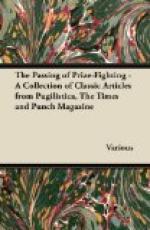For weeks past the House of Commons has been invited to believe that German “pill-boxes” were composed of British cement; and the case seemed clear when a British officer wrote from Flanders the other day that he had discovered in the German lines a label plainly marked “Artificial Portland.” Members were relieved to learn that the label came from a Belgian factory taken over by the Germans. “If those pill-boxes had really been made of our cement,” said a Medway representative, “we should be hammering at them still.”
Thursday, November 29th.—Question-time would be much more amusing if Ministers and Members were more accomplished in the art of repartee. A few are quick enough. When Mr. LEES SMITH complained that one of his statements had been described by the FOREIGN SECRETARY as a mare’s nest Lord ROBERT CECIL swiftly replied that he did not remember the incident, but had no doubt that if his right hon. friend used the term it was justified.
Under the Redistribution scheme as arranged by the Boundary Commissioners the name West Birmingham would have disappeared from the roll of constituencies. In graceful tribute to the memory of JOSEPH CHAMBERLAIN the House unanimously agreed to its reinstatement. It also changed the name of the Woodstock division to the Banbury division; but the idea that this was done as a compliment to the junior Member for the City of London is, I am told, erroneous.
* * * * *
“IN SUCH A QUESTIONABLE SHAPE.”
“This, of course, brings
up the almighty question—Who wrote
Shapespeare?”—Mr.
George Moore in “The Observer.”
A short answer to this almighty question is—Either Mr. GEORGE MOORE or the writer who determined “to call a spade a spape.”
* * * * *
“Cook-General, good
(26), Wanted immediately, or by December 6th,
for three months, in Exeter.
Wages 50s. per mouth.”—Express
and Echo (Exeter).
We confidently hope that she has only one.
* * * * *
[Illustration: Mother. “GOOD GRACIOUS! THAT’S NOT YOUR NEW BEST HAT?”
Child. “WELL, MOTHER, YOU KNOW I TOLD YOU WHEN WE GOT IT THAT IT WOULDN’T WEAR WELL.”
Mother. “I DON’T REMEMBER YOUR SAYING SO.”
Child. “YES, MOTHER. SURELY YOU REMEMBER I SAID, ’THE FIRST TIME THAT HAT’S SAT ON IT’S DONE FOR’?”]
* * * * *
BELIEVE ME OR BELIEVE ME NOT.
Although he had been rendered absolutely dumb by shell-shock the soldier was able to earn a little extra money by doing odd jobs. But nothing could get his speech back. It was a very stubborn and perplexing case. For eighteen months he had not succeeded in uttering a word, though understanding everything that was said to him. All the usual devices had failed; every kind of sudden surprise to startle him into articulation had been attempted; electricity had been passed through the muscles of the tongue and larynx; doctors had discussed him with a volubility only equalled by his own silence. But he remained dumb. It seemed hopeless.




